
34 minute read
for Faithful Citizenship
from Oct. 9, 2020
What does it mean to form my conscience?
Catholics have a long tradition of engagement in the public square. Sometimes that engagement requires making difficult moral decisions that impact our own lives and those of others. Our conscience can help guide the decisions we make. The Second Vatican Council guides us: “Always summoning (one) to love good and avoid evil, the voice of conscience can when necessary speak to (one’s) heart more specifically: do this, shun that” (“Gaudium et Spes,” 16). However, our conscience doesn’t just come to us when we are born. We must work throughout our lives to form it through prayer, learning and conversation.
Advertisement
How do I form my conscience?
It takes time to form our conscience so that we can make well-reasoned judgments about particular, real-life situations. The Church teaches that it is important to work continually on conscience formation so we can be prepared to make decisions whenever the opportunity arises.
Some specific ideas to form your conscience are: n Begin by being open to the truth and what is right. n Study Sacred Scripture and the teaching of the Church. n Examine the facts and background information about various choices and be discerning in where we gather information. n Prayerfully reflect to discern the will of God.
Additionally, it is important to consider how our community of faith can help us form good consciences through some of these steps: n Seek the prudent advice and good example of trusted leaders and others to support and enlighten our conscience. n Learn about the authoritative teaching of the Church. n Pray for the gifts of the Holy Spirit to help us develop our conscience. n Regularly partake in an examination of conscience to hear God’s voice in your life.
Prayer for conscience formation
I praise you Lord for creating me in Your Divine image. Thank You for giving me a free will to know You and love You. Open my heart to Your teachings and help me to form my conscience according to Your will.
Please strengthen me with the virtues of faith, hope, love, and especially prudence. Grant me Your loving guidance each day and send me the graces to always do Your will, even when most difficult.
Amen.
A closer look at Faithful Citizenship
Forming Consciences for Faithful Citizenship is the U.S. bishops’ teaching document on the political responsibility of Catholics. This statement represents guidance for the Catholic faithful in the exercise of their rights and duties as participants in our democracy.
As Catholics, we bring the richness of our faith to the public square. We draw from both faith and reason as we seek to affirm the dignity of the human person and the common good of all. Everyone living in this country is called to participate in public life and contribute to the common good.
As Catholics, we are part of a community with profound teachings that help us consider challenges in public life, contribute to greater justice and peace for all people, and evaluate policy positions, party platforms, and candidates’ promises and actions in light of the Gospel in order to help build a better world. Why does the Church teach about issues affecting public policy?
The Church’s obligation to participate in shaping the moral character of society is a requirement of our faith, a part of the mission given to us by Jesus Christ. As people of both faith and reason, Catholics are called to bring truth to political life and to practice Christ’s commandment to “love one another” (Jn 13:34).
The US Constitution protects the right of individual believers and religious bodies to proclaim and live out their faith without government interference, favoritism, or discrimination. Civil law should recognize and protect the Church’s right and responsibility to participate in society without abandoning its moral convictions. Our nation’s tradition of pluralism is enhanced, not threatened, when religious groups and people of faith bring their convictions into public life. The Catholic community brings to political dialogue a consistent moral framework and broad experience serving those in need.
Who should take part in political life?
In the Catholic tradition, responsible citizenship is a virtue, and participation in political life is a moral obligation. As Catholics, we should be guided more by our moral convictions than by our attachment to any political party or interest group. In today’s environment, Catholics may feel politically disenfranchised, sensing that no party and few candidates fully share our comprehensive commitment to human life and dignity. This should not discourage us. On the contrary, it makes our obligation to act all the more urgent. Catholic lay women and men need to act on the Church’s moral principles and become more involved: running for office, working within political parties, and communicating concerns to elected officials. Even those who cannot vote should raise their voices on matters that affect their lives and the common good. Faithful citizenship is an ongoing responsibility, not just an election year duty.
How can Catholic Social Teaching guide our participation?
In the words of Pope Francis, “progress in building a people in peace, justice and fraternity depends on four principles related to constant tensions present in every social reality. These derive from the pillars of the Church’s social doctrine, which serve as ‘primary and fundamental parameters of reference for interpreting and evaluating social phenomena.’” (“Evangelii Gaudium,” 221) The four principles include the dignity of the human person, the common good, subsidiarity and solidarity. Taken together, these principles provide a moral framework for Catholic engagement in advancing what we have called a “consistent ethic of life” (USCCB, “Living the Gospel of Life,” 22).
Rightly understood, this ethic does not treat all issues as morally equivalent; nor does it reduce Catholic teaching to one or two issues. It anchors the Catholic commitment to defend human life and other human rights, from conception until natural death, in the fundamental obligation to respect the dignity of every human being as a child of God.
Catholic voters should use Catholic teaching to examine candidates’ positions on issues and should consider candidates’ integrity, philosophy and performance. It is important for all citizens “to see beyond party politics, to analyze campaign rhetoric critically, and to choose their political leaders according to principle, not party affiliation or mere self-interest” (“Living the Gospel of Life,” 33) . THE DIGNITY OF THE HUMAN PERSON
Human life is sacred because every person is created in the image and likeness of God. There is a rich and multifaceted Catholic teaching on human dignity summarized in the Compendium of the Social Doctrine of the Church. Every human being “must always be understood in his unrepeatable and inviolable uniqueness ... This entails above all the requirement not only of simple respect on the part of others, especially political and social institutions and their leaders with regard to every man and woman on the earth, but even more, this means that the primary commitment of each person towards others, and particularly of these same institutions, must be for the promotion and integral development of the person” (131). Every political, economic, social, scientific and cultural program must be inspired by the awareness of the primacy of each human being over society” (132).
SUBSIDIARITY
It is impossible to promote the dignity of the person without showing concern for the family, groups, associations and local realities – in short, for those economic, social, cultural, recreational, professional and political communities to which people spontaneously give life and which make it possible for them to achieve effective social growth. The family, based on marriage between a man and a woman, is the fundamental unit of society. This sanctuary for the creation and nurturing of children must not be redefined, undermined or neglected. Supporting families should be a priority for economic and social policies. How our society is organized – in economics and politics, in law and public policy – affects the well-being of individuals and of society. Every person and association has a right and a duty to participate in shaping society to promote the wellbeing of individuals and the common good.
The principle of subsidiarity reminds us that larger institutions in society should not overwhelm or interfere with smaller or local institutions; yet larger institutions have essential responsibilities when the more local institutions cannot adequately protect human dignity, meet human needs, and advance the common good. groups or as individuals, to reach their fulfillment more fully and more easily.” (Compendium of the Social Doctrine of the Church, 164)
Human dignity is respected and the common good is fostered only if human rights are protected and basic responsibilities are met. Every human being has a right to life, a right to religious freedom, and a right to have access to those things required for human decency – food and shelter, education and employment, health care and housing. Corresponding to these rights are duties and responsibilities – to ourselves, to our families, and to the larger society.
The economy must serve people, not the other way around. An economic system must serve the dignity of the human person and the common good by respecting the dignity of work and protecting the rights of workers. Economic justice calls for decent work at fair, living wages, a broad and fair legalization program with a path to citizenship for immigrant workers, and the opportunity for all people to work together for the common good through their work, ownership, enterprise, investment, participation in unions, and other forms of economic activity. Workers also have responsibilities – to provide a fair day’s work for a fair day’s pay, to treat employers and coworkers with respect, and to carry out their work in ways that contribute to the common good. Workers, employers and unions should not only advance their own interests but also work together to advance economic justice and the well-being of all.
We have a duty to care for God’s creation, which Pope Francis refers to in Laudato Si’ as “our common home.” We all are called to be careful stewards of God’s creation and to ensure a safe and hospitable environment for vulnerable human beings now and in the future. And he calls all of us to an “ecological conversion,” by which “the effects of (our) encounter with Jesus Christ become evident in (our) relationship with the world around (us)”. (“Laudato Si’,” 217) Indeed, this concern with “natural ecology” is an indispensable part of the broader “human ecology,” which encompasses not only material but moral and social dimensions as well.
SOLIDARITY
Solidarity is “a firm and persevering determination to commit oneself to ... the good of all and of each individual, because we are all really responsible for all.” It is found in “a commitment to the good of one’s neighbor with the readiness, in the Gospel sense, to ‘lose oneself’ for the sake of the other instead of exploiting him, and to ‘serve him’ instead of oppressing him for one’s own advantage.” (Compendium of the Social Doctrine of the Church, 193)
We are one human family, whatever our national, racial, ethnic, economic, and ideological differences. Our Catholic commitment to solidarity requires that we pursue justice, eliminate racism, end human trafficking, protect human rights, seek peace, and avoid the use of force except as a necessary last resort.
In a special way, our
‘In the Catholic Tradition, responsible citizenship is a virtue, and participation in political life is a moral obligation.’ — “Forming Consciences for Faithful Citizenship,” 2019
A closer look at Faithful Citizenship
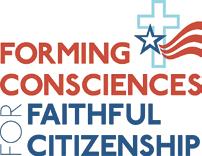
Learn more
At www.faithfulcitizenship.org: Download a searchable version of “Forming Consciences for Faithful Citizenship” in English or Spanish, watch explanatory videos, explore questions for reflection, and much more
solidarity must find expression in the preferential option for the poor and vulnerable. A moral test for society is how we treat the weakest among us – the unborn, those dealing with disabilities or terminal illness, the poor, and the marginalized.
How can the Church help us answer political and social questions?
A WELL-FORMED CONSCIENCE
The Church equips its members to address political questions by helping them develop wellformed consciences. We Catholics have a lifelong obligation to form our consciences in accord with human reason, enlightened by the teaching of Christ as it comes to us through the Church.
THE VIRTUE OF PRUDENCE
The Church also encourages Catholics to develop the virtue of prudence, which enables us “to discern our true good in every circumstance and to choose the right means of achieving it” (Catechism of the Catholic Church, 1806). Prudence shapes and informs our ability to deliberate over available alternatives, to determine what is most fitting to a specific context, and to act. Prudence must be accompanied by courage, which calls us to act. As Catholics seek to advance the common good, we must carefully discern which public policies are morally sound. At times, Catholics may choose different ways to respond to social problems, but we cannot differ on our obligation to protect human life and dignity and help build, through moral means, a more just and peaceful world.
DOING GOOD AND AVOIDING EVIL
There are some things we must never do, as individuals or as a society, because they are always incompatible with love of God and neighbor. These intrinsically evil acts must always be rejected and never supported. A preeminent example is the intentional taking of innocent human life, as in abortion. Similarly, human cloning, destructive research on human embryos, and other acts that directly violate the sanctity and dignity of human life including genocide, torture and the targeting of noncombatants in acts of terror or war, can never be justified. Nor can violations of human dignity, such as acts of racism, treating workers as mere means to an end, deliberately subjecting workers to subhuman living conditions, treating the poor as disposable, or redefining marriage to deny its essential meaning, ever be justified.
Opposition to intrinsically evil acts also prompts us to recognize our positive duty to contribute to the common good and act in solidarity with those in need. Both opposing evil and doing good are essential. As St. John Paul II said, “The fact that only the negative commandments oblige always and under all circumstances does not mean that in the moral life prohibitions are more important than the obligation to do good indicated by the positive commandment.” (“Veritatis Splendor,” 52) The basic right to life implies and is linked to other human rights such as a right to the goods that every person needs to live and thrive – including food, shelter, health care, education and meaningful work.
AVOIDING TWO TEMPTATIONS
Two temptations in public life can distort the Church’s defense of human life and dignity:
The first is a moral equivalence that makes no ethical distinctions between different kinds of issues involving human life and dignity. The direct and intentional destruction of innocent human life from the moment of conception until natural death is always wrong and is not just one issue among many. It must always be opposed.
The second is the misuse of these necessary moral distinctions as a way of dismissing or ignoring other serious threats to human life and dignity. Racism and other unjust discrimination, the use of the death penalty, resorting to unjust war, environmental degradation, the use of torture, war crimes, the failure to respond to those who are suffering from hunger or a lack of health care or housing, pornography, human trafficking, redefining civil marriage, compromising religious liberty, or unjust immigration policies are all serious moral issues that challenge our consciences and require us to act.

MAKING MORAL CHOICES
The bishops do not tell Catholics how to vote; the responsibility to make political choices rests with each person and his or her properly formed conscience, aided by prudence. This exercise of conscience begins with always opposing policies that violate human life or weaken its protection.
When morally flawed laws already exist, prudential judgment is needed to determine how to do what is possible to restore justice – even if partially or gradually – without ever abandoning a moral commitment to full protection for all human life from conception to natural death.
As Catholics we are not single-issue voters. A candidate’s position on a single issue is not sufficient to guarantee a voter’s support. Yet a candidate’s position on a single issue that involves an intrinsic evil, such as support for legal abortion or the promotion of racism, may legitimately lead a voter to disqualify a candidate from receiving support.
What public policies should concern Catholics most?
As Catholics, we are led to raise questions about political life other than those that concentrate on individual, material well-being. We focus more broadly on what protects or threatens the dignity of every human life. Catholic teaching challenges voters and candidates, citizens and elected officials, to consider the moral and ethical dimensions of public policy issues. In light of ethical principles, we bishops offer the following policy goals that we hope will guide Catholics as they form their consciences and reflect on the moral dimensions of their public choices: n Address the preeminent requirement to protect human life – by restricting and bringing to an end the destruction of unborn children through abortion and providing women in crisis pregnancies with the supports they need. End the following practices: the use of euthanasia and assisted suicide to deal with the burdens of illness and disability; the destruction of human embryos in the name of research; the use of the death penalty to combat crime; and the imprudent resort to war to address international disputes. n Protect the fundamental understanding of marriage as the life-long and faithful union of one man and one woman as the central institution of society; promote the complementarity of the sexes and reject false “gender” ideologies; provide better support for family life morally, socially and economically, so that our nation helps parents raise their children with respect for life, sound moral values and an ethic of stewardship and responsibility. n Achieve comprehensive immigration reform that offers a path to citizenship, treats immigrant workers fairly, prevents the separation of families, maintains the integrity of our borders, respects the rule of law, and addresses the factors that compel people to leave their own countries. n Help families and children overcome poverty and ensure access to and choice in education, as well as decent work at fair, living wages and adequate assistance for the vulnerable in our nation, while also helping to overcome widespread hunger and poverty around the world, especially in the policy areas of development assistance, debt relief and international trade. n Ensure full conscience protection and religious freedom for individuals and groups to meet social needs, and so enable families, community groups, economic structures, and government to work together to overcome poverty, pursue the common good and care for creation. n Provide health care while respecting human life, human dignity and religious freedom in our health care system. n Continue to oppose policies that reflect racism, hostility toward immigrants, religious bigotry and other forms of unjust discrimination. n Establish and comply with moral limits on the use of military force with a special view to seeking a responsible and effective response for ending the persecution of Christians and other religious minorities in the Middle East and other parts of the world. n Join with others around the world to pursue peace, protect human rights and religious liberty, and advance economic justice and care for creation.
— U.S. Conference of Catholic Bishops
Padre Julio Domínguez
Ricos en misericordia
En estos días me ha tocado vivir momentos bien difíciles en mi propia familia y también en nuestra hermosa familia diocesana.
Ya tenemos meses sufriendo las consecuencias de este virus que, como muchos dicen, llegó para no irse. Por supuesto que escuchando a los amigos y a mucha gente sufriendo, me llevaba a ponerme en oración y suplicar a nuestro buen Dios que nos ayudara a pasar este mal momento.
No fue hasta que la enfermedad llegó a las puertas de mi familia, llevándose a uno de mis tíos muy queridos y a uno de mis primos hermanos, y casi arrastrando a una de mis tías que sigue luchando aún por su vida, que me di cuenta de manera encarnada y real de lo que muchos de mis hermanos en Cristo están sufriendo.
No tiene mucho que una jovencita me habló a mi teléfono. Como la mayoría de nosotros, había pasado por ese momento de despreocupación, es decir, un virus que viene pero que pronto pasará. Sin embargo, cuando vio que su mamá enfermó entró en pánico y ahora está en crisis psicológica debido al encierro y la posibilidad real de ser infectada.
Otra realidad que me ha tocado vivir en estos días son las crisis financieras de mucha gente. ¿A qué quiero llegar con todo esto? A darnos cuenta que necesitamos seguir orando a Dios por todo esto que está pasando. Pero también a levantar nuestra mirada y darnos cuenta que eso podría pasar en nuestra propia persona o familia.
El espíritu de compasión debe ser alimentado. No porque estemos bien no está pasando nada en el mundo.
Queridos hermanos, este es un tiempo de volvernos ricos en misericordia. Misericordia quiere decir dar el corazón al miserable. Y sabemos que la miseria no es tan solo algo material, sino que viene vestida de muchas formas como la depresión moral y psicológica, el suicidio, los pleitos en casa, el trauma en los niños y muchas otras manifestaciones.
Lanzo una petición a todos los lectores a que nos pongamos alertas para poder ayudarnos unos a otros y no dejar nunca a nadie solo. Cerca de ti habrá siempre un hermano que necesite una llamada, una despensa, unas palabras de consuelo.
Les pido que recemos todos los días la Coronilla de la Misericordia, porque allí descubriremos que así como le pedimos a Dios misericordia, Él nos invita a ser misericordiosos con nuestro prójimo.
Dios les bendiga.

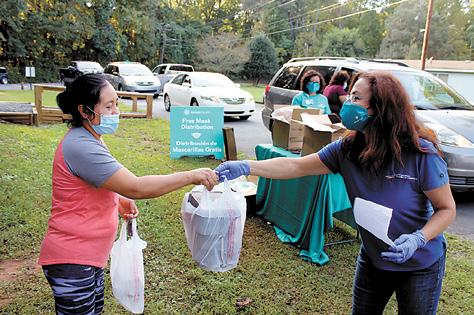
CÉSAR HURTADO | CATHOLIC NEWS HERALD Llevando adelante un programa de revitalización económica con fondos de la Ciudad de Charlotte, la Cámara de Comercio Latinoamericana que dirige Rocío González ha beneficiado a más de 40 pequeños negocios latinos del rubro de la alimentación y 3200 familias afectadas por la pandemia de COVID-19.
Cámara de Comercio Latinoamericana entrega ayuda en alimentos
CÉSAR HURTADO REPORTERO
CHARLOTTE — A través de un novedoso programa que beneficia la reactivación económica de pequeños negocios y la asistencia alimentaria familiar, la Cámara de Comercio Latinoamericana de Charlotte (LACCC) viene sirviendo a la comunidad latina afectada por la pandemia de COVID-19.
Rocío González, directora ejecutiva de LACCC, dijo que esa institución, gracias a una subvención otorgada por el gobierno del Condado Mecklenburg, puede ayudar a más de 40 negocios relacionados con la industria de la alimentación, a la vez que “al comprar sus productos se ayuda a alimentar a la comunidad en necesidad”.
González indicó que LACCC fue una de las ocho instituciones seleccionadas en el Condado Mecklenburg para recibir subvenciones destinadas a fomentar la reactivación económica de los pequeños negocios locales.
“Estamos muy agradecidos con la Ciudad. Nuestro proyecto, que tiene dos vertientes para beneficiar, la de los empresarios y la de la comunidad en general, permite que por ocho semanas se ayude a que los propietarios de pequeños negocios latinos de restaurantes, catering y food trucks reciban un alivio, mantengan sus negocios abiertos y nos vendan sus productos que gratuitamente distribuimos entre la población latina más necesitada”.
González subrayó que las autoridades de la Ciudad y la Coalición de Fe y Salud fueron sus grandes aliados para llegar a la comunidad en general, el sistema escolar, instituciones hospitalarias, parques de casas móviles y organizaciones religiosas.
“Hemos coordinado con el hermano Eduardo (Bernal, coordinador del ministerio hispano del Vicariato de Charlotte), lo que nos ha permitido llevar ayuda alimentaria a varias iglesias, entre ellas la parroquia Nuestra Señora de Guadalupe, que recibe 50 tarjetas de alimentos cada martes”.
El ministerio hispano del Vicariato de Charlotte, a través de su coordinador, forma parte de la Coalición de Fe y Salud que se reúne regularmente para evaluar las necesidades de la población cristiana del condado, diseñar y establecer programas de asistencia dirigidos a la comunidad latina.
González afirmó que “desde el 25 de agosto hemos servido a más de 3200 familias de 4 integrantes e invertido casi 23 mil dólares semanales”, teniendo en cuenta que, “que ni una sola ración de comida se ha desperdiciado”.
Como parte de este programa, el pasado jueves 1 de octubre, en un parque de casas móviles localizado al este de Charlotte, se entregaron 300 raciones alimenticias proporcionadas por un food truck instalado en las inmediaciones. Decenas de personas formaron línea a pié o dentro de sus autos para recibir los alimentos. El programa de prevención de COVID-19 de Atrium Health se hizo presente repartiendo mascarillas y desinfectante de manos entre los asistentes.
FACEBOOK.COM/ CATHOLIC NEWS HERALD ESPAÑOL
catholicnewsherald.com | October 9, 2020
CÉSAR HURTADO REPORTERO
CHARLOTTE — En una reunión virtual llevada a cabo el pasado jueves 1 de octubre, líderes eclesiásticos de la Región XIV expusieron la necesidad y beneficios del proceso del Quinto Encuentro de la Pastoral Hispana ante otros líderes de la Iglesia del Sureste de los Estados Unidos.
El Padre Rafael Capó, pieza fundamental en el proceso de organización regional del Quinto Encuentro, dijo que el proceso fue “guiado por la espiritualidad dictada por el Papa Francisco de convertirnos en discípulos misioneros” que, “con empatía y alegría en el Evangelio sepan cómo llegar a sus hermanos y acompañarlos en su fe y vida diaria”.
El P. Capó, nacido en Puerto Rico, es sacerdote de la arquidiócesis de Miami y Misionero de la Misericordia por nombramiento del Papa Francisco. Vicepresidente de Misión y Ministerio en St. Thomas University en Miami y líder de la pastoral hispana en los Estados Unidos, ha ejercido como director de la Oficina e Instituto Pastoral de la Pastoral Hispana de los Obispos del Sureste (SEPI).
“¿Por qué se necesitaba un Quinto Encuentro?”, preguntó el P. Capó. “Para demostrar la realidad que los católicos latinos son una mayoría emergente en la Iglesia en Estados Unidos; para reconocer que la Iglesia necesita una nueva generación de líderes que incluya el liderazgo hispano en parroquias, diócesis, escuelas e instituciones católicas; y para asumir la necesidad de atraer a grandes segmentos de jóvenes hispanos de segunda y tercera generación”, respondió.
Por esta razón, aseguró que el objetivo del Quinto Encuentro era el de discernir las diferentes maneras en las que la Iglesia puede responder a la presencia de los hispanos y fortalecer la manera en la que los latinos responden como Iglesia.
Para el Padre Capó, el Quinto Encuentro sirvió para detectar la urgente necesidad de evangelización en los jóvenes hispanos, en familias, en inmigrantes, catequesis de niños y jóvenes y la formación de una nueva generación de líderes pastorales.
El largo proceso del Quinto Encuentro, que se extiende por varios años y se encuentra en la etapa de aplicación de sus conclusiones, partió desde sus bases, es decir, recogiendo las inquietudes del pueblo católico hispano desde el nivel parroquial, luego diocesano, regional y finalmente nacional.
Diez fueron las comisiones de trabajo principales del Quinto Encuentro: Evangelización y misión; Formación en la fe y catequesis; Ministerio de familia;
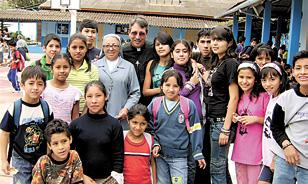
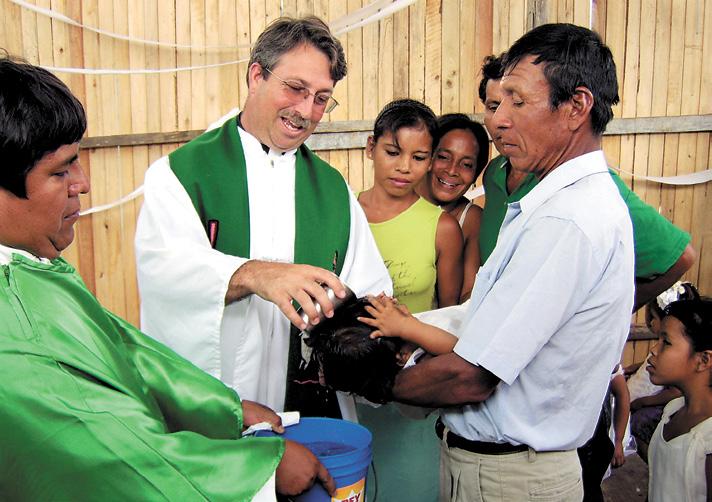
FOTOS CORTESÍA PADRE MARCOS LAWLOR Apenas ordenado en 1995, el Padre Marcos Lawlor asumió la responsabilidad del ministerio hispano en la parroquia Sagrada Familia en Clemmons, el grupo juvenil y la comunidad hispana de Cristo Rey en Yadkinville. En las fotos, desde arriba y en sentido horario; el Padre Marcos celebra un bautizo en una humilde capilla en la región selvática de Perú utilizando un balde de plástico; aparece junto a participantes de un programa juvenil salesiano en Huánuco, Perú; celebra Misa en una capilla de la amazonía; y bendice a los asistentes a la celebración de la fiesta Nuestra Señora de Guadalupe en la Iglesia Santa Teresa en Mooresville
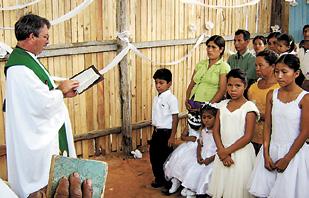
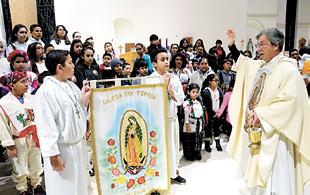
Mi viaje en el Ministerio Hispano
En el mes de la Herencia Hispana el Padre Marcos Lawlor relata su feliz encuentro con la cultura latina
PADRE MARCOS LAWLOR ESPECIAL PARA CATHOLIC NEWS HERALD
CHARLOTTE — A veces me preguntan cómo llegué a hablar español. Bueno, en verdad, todavía estoy aprendiendo.
Sonrío mientras reflexiono sobre este viaje que se remonta a más de treinta años. En la escuela secundaria me dijeron que necesitaba estudiar otro idioma para ser aceptado en la universidad. No sabía qué estudiar. Algunos de mis amigos habían tomado latín y recibido malos grados, así que consideré que ese idioma era demasiado difícil y me decidí por el español, el que estudié por dos años.
En aquellos días, el énfasis no estaba en el español conversacional, sino que era un comienzo básico. Ciertamente nunca imaginé hace muchos años que el español se convertiría en mi segundo idioma.
NECESIDAD DE HABLAR ESPAÑOL
Hay algunas experiencias que ayudaron a dar forma a mi perspectiva durante mi formación al sacerdocio. En un viaje misionero, estaba con un sacerdote y un pequeño grupo para celebrar una Misa en un granero para algunos trabajadores migrantes en Arkansas. Treinta hombres hispanos vivían en este granero en condiciones muy humildes y trabajaban en las granjas de esa zona. Esa fue mi primera experiencia con migrantes.
Como seminarista, recuerdo haber ido a un hospital en Charlotte para llevar la comunión a un feligrés después de su cirugía. En el pasillo, una mujer me preguntó: “¿Es usted sacerdote?” Le respondí que no, pero que era seminarista. Ella me preguntó si podría visitar a su padre que estaba hospitalizado y si le podría llevar la Sagrada Comunión. Cuando entramos en el cuarto, ella dijo: “Somos de Bolivia y él sólo habla español”. Realicé un servicio de Comunión y ella tradujo al español lo que yo iba diciendo en inglés. Entonces pensé para mí mismo que debería aprender a comunicarme en español para mi futuro ministerio sacerdotal.
En otra ocasión, estaba en las montañas de Carolina del Norte rumbo a la parroquia en Spruce Pine. Acababa de detenerme para poner gasolina a mi coche y vi a seis hombres hispanos de pie junto a la carretera, aparentemente esperando por alguien que los lleve. En esa área, muchos hispanos trabajan para los cultivadores de árboles de Navidad. Pensé para mí mismo, “Esta es una zona rural. Me gustaría ir a hablar con esos hombres, pero no hablo español”.
En el seminario, tomé la decisión de aprender español. Me inscribí en dos clases de español general y luego en dos de español pastoral.
MANOS A LA OBRA
Después de mi ordenación en 1995, pensé que tendría uno o dos años para ingresar al Ministerio Hispano.
Mi primer pastor, el Padre Thomas Walsh, me dijo a mi llegada a la parroquia Sagrada Familia en Clemmons: “Bueno, Marcos, tienes la responsabilidad del ministerio aquí y también eres el capellán de nuestro Grupo de Jóvenes y de la Comunidad Hispana de Cristo Rey en Yadkinville”. Entonces, me di cuenta que no tenía un año o dos años para trabajar en ello y que tenía que tomar la responsabilidad de inmediato.
Las familias en Cristo Rey fueron muy amables y pacientes conmigo. Después de unos meses, reconocí mis limitaciones en la comunicación en español, especialmente con confesiones, homilías y consejos pastorales. Le pedí al Obispo Curlin que me permitiera participar en una escuela de idiomas en México por un mes. Él respondió: “Si su pastor lo aprueba, yo lo apruebo”.
Esa inmersión fue una gran experiencia para mí. Viví con una familia en Cuernavaca, México, asistí a clases y ayudé en una parroquia local. También visité catedrales, conventos, santuarios y sitios históricos. Esa inmersión me abrió los oídos al idioma y me ayudó a comprender y comunicarme mejor.
LARGA TRAYECTORIA
En los últimos 25 años, he estado involucrado en el ministerio hispano en cada una de mis tareas. Después de Clemmons, serví en Winston-Salem, Biscoe, Jefferson, Sparta, Charlotte y ahora en Mooresville. Con los años, he celebrado más de 1,500 misas en español y probablemente he bautizado a unas 2,000 personas en español. También hay en la cuenta muchas celebraciones por la fiesta de Nuestra Señora de Guadalupe, bendiciones de casas, quinceañeras, bodas y fiestas familiares.
Mis viajes a América Latina y el ministerio pastoral aquí en la diócesis han enriquecido enormemente mi vida y ministerio. Como pastor y como supervisor de seminaristas, siempre he alentado a los vicarios y seminaristas parroquiales a pasar un tiempo aprendiendo el idioma español y su rica cultura.
Con los años, he escuchado algunos comentarios negativos con respecto al Ministerio Hispano, pero estoy convencido de que vale la pena el esfuerzo. La participación en eventos como el Congreso Eucarístico demuestra la tremenda energía y fe de los muchos hispanos en nuestro medio.
Para mí, el viaje ha sido alegre.
Más sobre el Padre Lawlor
San Juan XXIII
“¡Oh, los santos, los santos del Señor, que por doquier nos alegran, nos animan y nos bendicen!”, decía San Juan XXIII, llamado el “Papa bueno” y cuya fiesta es el 11 de octubre
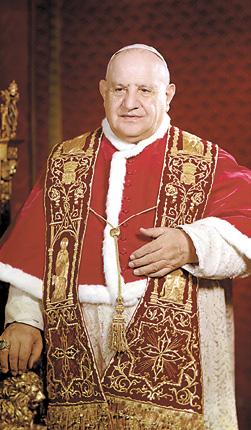
Angelo Giuseppe Roncalli, más conocido como San Juan XXIII, nació en Italia en 1881. Ingresó desde muy joven al seminario y fue ordenado sacerdote en 1904.
En la Segunda Guerra Mundial, siendo Obispo, salvó a muchos judíos con ayuda del “visado de tránsito” de la Delegación Apostólica.
En 1953 fue señalado Cardenal y a la muerte de Pío XII, fue elegido como Sumo Pontífice en 1958. Poco a poco se ganó el apelativo de “Papa Bueno” por sus cualidades humanas y cristianas.
El mundo entero pudo ver en él a un pastor humilde, atento, decidido, valiente, sencillo y activo. Se enrumbó por los caminos del ecumenismo y del diálogo con todos. Escribió las famosas encíclicas “Pacem in terris” y “Mater et magistra” y convocó al Concilio Vaticano II.
Es llamado a la Casa del Padre el 3 de junio de 1963, beatificado por San Juan Pablo II en 2000 y canonizado por el Papa Francisco en abril de 2014.
El milagro para su beatificación se basó en la curación de Sor Caterina Capitani, una religiosa que tenía una dolencia estomacal muy grave.
Las hermanas de la paciente, que conocían de la gran admiración de Sor Caterina por Juan XXIII, oraron pidiendo la intercesión del “Papa bueno” y colocaron una imagen de él en el estómago de la paciente.
Minutos después la religiosa empezó a sentirse bien y pidió comer. Más adelante, Sor Caterina relataría que vio a Juan XXIII sentado al pie de su cama y que le dijo que su plegaria había sido escuchada. La ciencia no pudo dar explicaciones de esta curación.
CONCILIO VATICANO II
Este 11 de octubre se cumplen 58 años de la apertura del Concilio Vaticano II, un acontecimiento eclesial ecuménico que buscó la actualización de la Iglesia en el mundo actual.
Desde la apertura se destacó la naturaleza pastoral de sus objetivos: no se trataba de definir nuevas verdades ni condenar errores, sino que era necesario renovar la Iglesia para hacerla capaz de transmitir el Evangelio en los nuevos tiempos, buscar los caminos de unidad con las otras confesiones cristianas, buscar lo bueno de los nuevos tiempos y establecer un diálogo con el mundo moderno, centrándose primero “en lo que nos une y no en lo que nos separa”.
Al Concilio fueron invitados como observadores miembros de diversos credos, desde musulmanes hasta indios americanos, así como miembros de todas las iglesias cristianas: ortodoxos, anglicanos, cuáqueros, y protestantes en general, incluyendo, evangélicos, metodistas y calvinistas no presentes en Roma desde el tiempo de los cismas.
De esta forma, el Concilio Vaticano II se convirtió en el acontecimiento más decisivo de la historia de la Iglesia en el siglo XX. San Juan XXIII no alcanzó a conocer las conclusiones porque falleció el 3 de junio de 1963. Fue clausurado el 8 de diciembre de 1965 y desde él se originaron importantes documentos que siguen siendo de gran actualidad.
— Condensado de ACIPRENSA
FE FAMILIA FRATERNIDAD
Caballeros de Colón
Considere unirse a los más de 2 millones de miembros de la organización fraternal católica más grande del mundo y registrándose en línea hoy en: www.kofc.org/es
Fiesta del Señor de los Milagros podrá seguirse ‘online’
CÉSAR HURTADO REPORTERO
CHARLOTTE — Las Hermandades del Señor de los Milagros en Charlotte suspendieron todas las actividades conmemorativas que tradicionalmente realizaban durante el mes de octubre, debido a las medidas sanitarias decretadas por las autoridades locales, estatales y federales por la pandemia de COVID-19.
En un escueto mensaje, la Primera Hermandad de Cargadores y Sahumadoras nos comunicó que “por el momento, todas las actividades han sido suspendidas hasta próximo aviso”. A fines de octubre del año pasado, esta hermandad realizó una Misa y Procesión en la parroquia San Gabriel en Charlotte.
Por su parte, la hermandad del Señor de los Milagros de South Charlotte suspendió la procesión que regularmente llevaba a cabo en la parroquia Nuestra Señora de Guadalupe, pero invitó a la comunidad peruana y latinoamericana a una Misa que se celebrará en honor del Señor de los Milagros el domingo 11 de octubre a las 2 de la tarde en la Iglesia Guadalupe, la que será transmitida “en vivo” por la página de Facebook de esa parroquia.
ACTIVIDADES EN PERÚ
Lecturas Diarias OCTUBRE 11-17 1: 15-23, Lc 12: 8-12 OCTUBRE 18-24
La cancelación de las actividades por la importante festividad católica peruana, alcanzó también a la ciudad de Lima, capital de Perú, donde anualmente se celebran procesiones multitudinarias durante el mes de octubre, al que han denominado “Mes Morado” por el color de los hábitos que utilizan los fieles seguidores de esta devoción.
La Municipalidad de Lima, a través de numerosas publicaciones, ha solicitado a todos los fieles que se abstengan de asistir al templo de Las Nazarenas, donde se encuentra la venerada imagen del Señor de los Milagros, y acompañen “al Señor de los Milagros desde casa” a través de las señales “en directo” de las páginas de Facebook Nazarenas TV y Museo Señor de los Milagros. “Busquemos al Señor donde vive… en nuestros corazones”, señalaron.
Nazarenas TV ha programado una serie de programas de “Recordando las procesiones”, los días 18, 19 y 28 de octubre. Igualmente ofrecerá la transmisión directa de las Misas que celebrará Monseñor Carlos Gustavo Castillo Mattasoglio, Arzobispo de Lima, desde el Santuario de Las Nazarenas, los domingos 18 y 28 de octubre a las 11 de la mañana.
DEVOCIÓN MILENARIA
El 13 de noviembre de 1655 un terrible terremoto estremeció Lima, dejando miles de víctimas mortales y damnificados. En Pachacamilla, un barrio de esclavos angoleños, la imagen de un Cristo moreno quedó intacta.
La fiesta religiosa tuvo su inicio en 1687 cuando, en una procesión de rogativas, el mayordomo de la capilla del Santo Cristo, Don Sebastián de Antuñano, sacó una copia en óleo de la pintura original del Cristo por las calles de la ciudad de Lima, semidestruida por un terremoto de quince minutos de duración, pidiendo el cese del cataclismo.
En 1746, Lima padeció el terremoto más destructor de su historia y, según se refiere, una réplica de la imagen salió en procesión y la tierra dejó de temblar, lo que acrecentó la devoción del pueblo. Posteriormente se construyó la Iglesia de las Nazarenas, que hoy es el santuario donde se le rinde culto.
Nombrado en 1715 ‘Patrón Jurado de la Ciudad de Lima’ y desde 2005 designado por la Santa Sede como ‘Patrón de los Peruanos Residentes e Inmigrantes’, el Señor de los Milagros es también ‘Patrón del Perú’ desde 2010.
Mas online
En facebook.com/nazarenastv: Puede seguir diariamente las Misas que se celebran en el Santuario Las Nazarenas, además de programas especiales sobre la devoción al
Domingo: Is 25: 6-10, Fil 4: 12-14. 19-20, Mt 22: 1-14; Lunes: Gal 4: 22-24. 26-27. 31–5, Lc 11: 29-32; Martes: Gal 5: 1-6, Lc 11: 37-41; Miércoles (San Calixto): Gal 5: 18-25, Lc 11: 42-46; Jueves (Santa Teresa de Ávila): Ef 1: 1-10, Lc 11: 47-54; Viernes: Ef 1: 11-14, Lc 12: 1-7; Sábado (San Ignacio de Antioquía): Ef Señor de los Milagros
Domingo: Is 45: 1.4-6, 1 Tes 1: 1-5, Mt 22, 34-40; Lunes (Santos Juan de Brébeuf e Isaac Jogues): Ef 2: 1-10, Lc 12: 13-21; Martes: Ef 2: 12-22, Lc 12: 35-38; Miércoles: Ef 3: 2-12, Lc 12: 39-48; Jueves: Ef 3: 14-21, Lc 12: 49-53; Viernes: Ef 4: 1-6, Lc 12: 5459; Sábado: Ef 4: 7. 11-16, Lc 13: 1-9

OCTUBRE 25-31
Domingo: Ex 22: 20-26, 1 Tes 1: 5-10, Mt 21: 33-43; Lunes: Ef 4: 32–5, 8, Lc 13: 10-17; Martes: Ef 5: 21-33, Lc 13: 18-21; Miércoles (Santos Apóstoles Simón y Judas): Ef 2: 19-22, Lc 6: 12-19; Jueves: Ef 6: 10-20, Lc 13: 31-35; Viernes: Flp 1: 1-11, Lc 14: 1-6; Sábado: Flp 1: 18-26, Lc 14: 1. 7-11

